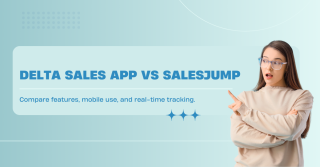Sales Team, Distributors, and Retailers for FMCG Route-to-Market Success
_1737028325.png)
In the dynamic world of Fast-Moving Consumer Goods (FMCG), ensuring that products reach the end consumer with efficiency and consistency is paramount for success. A well-designed Route-to-Market (RTM) strategy is the backbone of FMCG companies, enabling them to effectively connect with consumers, retailers, and distributors. However, for an RTM strategy to truly succeed, it’s crucial to focus on enabling the sales team, distributors, and retailers. The alignment and collaboration of these three stakeholders can significantly influence the outcome of a brand’s market performance.
In this article, we’ll explore how empowering sales teams, distributors, and retailers can drive success in the FMCG route-to-market strategy and contribute to business growth. Along with practical insights, we’ll examine key components, best practices, and tools that can help businesses leverage this essential strategy to optimize their operations and boost market penetration.
What is Route-to-Market (RTM) in FMCG?
Route-to-Market refers to the path a product takes from the manufacturer or producer to reach the end consumer. In the context of FMCG, this involves a network of distributors, retailers, and sometimes direct-to-consumer channels. The strategy incorporates everything from product distribution, marketing, pricing, and sales efforts, making it a critical part of FMCG operations.
The goal of Route-to-Market is to ensure that products are readily available at the right places, in the right quantities, and at the right time, so consumers can easily access them. Effective RTM strategies drive sales, expand market reach, and enhance customer loyalty.
The Importance of Enabling the Sales Team in FMCG
The sales team is at the frontline of FMCG distribution. Their ability to effectively engage with distributors, retailers, and customers is vital to the success of an RTM strategy. Empowering the sales team means equipping them with the right tools, training, and incentives to achieve optimal performance.
1. Equipping the Sales Team with Tools and Technology
Modern sales enablement tools are essential for streamlining the sales process. Sales teams in FMCG need tools that help them manage relationships, track inventory, and monitor sales performance in real-time. Using Customer Relationship Management (CRM) systems, sales force automation (SFA) software, and mobile apps can drastically improve how sales representatives engage with distributors and retailers.
These tools enable the sales team to access real-time data on product availability, market trends, and customer preferences. Armed with this data, salespeople can offer tailored solutions to distributors and retailers, increasing the likelihood of closing deals and achieving sales targets.
2. Ongoing Training and Development
Training is crucial for any sales team, especially in the FMCG sector, where the competitive landscape is constantly evolving. FMCG companies need to ensure that their sales teams are equipped with up-to-date knowledge about product features, pricing, promotions, and market trends. Regular training programs and workshops on product knowledge, negotiation skills, and relationship building can improve the efficiency of the sales team and drive higher sales.
3. Motivation and Incentives
A motivated sales team is key to driving sales success. Implementing incentive programs that reward performance can help keep the sales team motivated. Providing bonuses, commissions, or other incentives for achieving sales targets ensures that the team remains focused and productive, ultimately improving overall route-to-market success.
Distributor Relationship Management: Key to FMCG Route-to-Market Efficiency
Distributors are crucial partners in any FMCG RTM strategy. They ensure that products are delivered efficiently from manufacturers to retailers. However, to maintain a successful RTM operation, brands must establish strong relationships with their distributors, ensuring that the entire process runs smoothly.
Distributor relationship management is the cornerstone of an effective RTM strategy. Maintaining transparent, continuous communication with distributors helps ensure the timely delivery of goods, avoids stockouts, and maintains inventory levels that align with consumer demand. By providing distributors with access to real-time data via sales enablement tools, brands can better forecast demand, plan inventory, and resolve potential issues before they become major challenges.
The use of field sales automation tools also plays a significant role in streamlining distributor operations. These tools automate order processing, inventory management, and reporting, ensuring that distributors can respond quickly to changes in demand and maintain product availability without being bogged down by administrative tasks.
Fostering strong, mutually beneficial relationships with distributors is essential for long-term success in FMCG. By leveraging technology and maintaining open lines of communication, FMCG brands can ensure a smooth and efficient distribution process, enabling them to stay ahead of competitors in the marketplace.
The Role of Distributors in the FMCG RTM Strategy
Distributors are the backbone of any FMCG route-to-market strategy. They are responsible for managing inventory, ensuring products are delivered on time, and maintaining relationships with retailers. Therefore, it’s essential to enable distributors with the tools, training, and resources they need to ensure efficient operations.
1. Enhancing Distributor Relationships
Effective communication and relationship management with distributors are key to success. By establishing clear communication channels and regularly engaging with distributors, FMCG companies can ensure that their products are always available to meet customer demand. Distributor relationship management software helps brands track the performance of their distributors and streamline communication.
Furthermore, it is essential to keep distributors motivated. Offering training, product updates, and financial incentives for meeting performance metrics can help foster long-term partnerships and ensure distributors are fully aligned with the brand’s goals.
2. Supporting Efficient Inventory Management
One of the most significant challenges for distributors in FMCG is managing inventory levels. Distributors need to ensure that stock is adequately replenished without overstocking, which can lead to excess costs. Implementing an inventory management system that helps distributors track stock levels in real-time, forecast demand, and optimize replenishment can go a long way in minimizing these challenges.
Advanced analytics and forecasting tools allow distributors to plan ahead and ensure products are available at the right place and time, reducing the risk of stockouts and lost sales opportunities.
3. Streamlining the Order Fulfillment Process
Order fulfillment is another critical aspect of distributor success. FMCG brands should focus on automating and streamlining order fulfillment processes to ensure distributors can process orders quickly and efficiently. Implementing order management systems (OMS) can help distributors track orders, monitor shipping, and resolve potential issues before they impact the retail chain.
Enabling Retailers for FMCG Route-to-Market Success
Retailers are the final touchpoint in the FMCG route-to-market strategy. Their ability to showcase products effectively, maintain proper stock levels, and engage with consumers can make or break a brand’s success. Enabling retailers means providing them with the tools, training, and incentives to promote products efficiently.
1. Providing Retailer Support and Training
Retailers must be well-equipped to sell FMCG products. Retailer training programs that focus on product knowledge, customer service, and sales techniques are critical for success. In addition, creating support materials such as visual merchandising guides, point-of-sale (POS) displays, and promotional assets can help retailers effectively present products to consumers.
2. Effective Promotions and Discounts
FMCG brands should work closely with retailers to create attractive in-store promotions and discount schemes. Promotions can drive sales by encouraging consumers to try new products or buy in larger quantities. Offering exclusive deals to retailers for passing along to customers can boost sales, improve product visibility, and increase brand loyalty.
3. Real-Time Data Sharing
Just as sales teams and distributors rely on data, so do retailers. By providing retailers with access to real-time sales data and inventory insights, brands can help retailers optimize their stock levels and avoid stockouts. This data can also help retailers plan more effectively, adjust pricing strategies, and personalize marketing efforts to meet consumer needs.
Best Practices for Optimizing FMCG RTM Success
1. Collaboration Across All Stakeholders
A successful RTM strategy requires collaboration between sales teams, distributors, and retailers. Brands should establish communication channels and regular touchpoints with all stakeholders. This alignment helps maintain consistent messaging, optimize promotions, and ensure that products are always available when and where consumers need them.
2. Leverage Technology for Streamlined Operations
Investing in technology can significantly enhance RTM performance. Tools for CRM, sales automation, inventory management, and data analytics can provide valuable insights and streamline processes for all stakeholders. Whether it’s sales teams, distributors, or retailers, technology can facilitate communication, monitor performance, and drive operational efficiency.
3. Continuous Feedback and Improvement
Gathering feedback from sales teams, distributors, and retailers is crucial for refining your RTM strategy. By consistently collecting insights and assessing the effectiveness of your current approach, you can identify areas for improvement and implement changes to better meet market demands.
4. Focus on Customer-Centric Strategies
At the heart of any RTM strategy is the consumer. Ensuring that your RTM model is designed around customer needs—whether through product availability, promotional activities, or personalized shopping experiences—will enhance consumer loyalty and drive long-term success.
Retailer Engagement: The Final Step to FMCG RTM Success
While distributors are essential for getting products to the right locations, retailers are the final link in the FMCG RTM chain. Engaging retailers effectively is critical to ensuring that products are displayed, stocked, and promoted correctly to drive sales.
Sales enablement tools play a crucial role in this process by equipping retailers with valuable insights into inventory levels, sales trends, and upcoming promotions. This allows retailers to plan more effectively, stock products on time, and ensure they meet consumer demand. Additionally, providing training to retailers through sales enablement tools ensures they understand key product features, benefits, and promotional strategies. This enables them to promote products more effectively to consumers, improving in-store sales and overall brand visibility.
With field sales automation, sales teams can maintain efficient communication with retailers, ensuring that orders are placed on time, stock levels are regularly updated, and promotional efforts are executed seamlessly. By leveraging real-time data and automation, FMCG brands can ensure that retail execution is consistent across all locations, which is key to maximizing sales potential.
Ultimately, retailer engagement is about more than just getting products on shelves; it’s about ensuring that products are well-promoted, visible, and accessible to consumers, driving better sales performance and stronger brand loyalty.
Conclusion
The success of an FMCG Route-to-Market strategy hinges on empowering and enabling the sales team, distributors, and retailers. By equipping them with the right tools, providing continuous training, fostering strong relationships, and leveraging technology, FMCG brands can streamline operations, improve market penetration, and ultimately drive growth. When all stakeholders are aligned and fully engaged in the process, the result is a seamless, efficient, and successful RTM strategy that benefits both brands and consumers alike.
FAQs
1. How can technology enhance FMCG Route-to-Market strategies?
Technology improves FMCG RTM by providing real-time data for sales, inventory management, and consumer behavior. Tools like CRM, sales force automation, and mobile apps help streamline operations and enable all stakeholders to collaborate effectively.
2. Why is distributor management important in FMCG RTM?
Distributors play a critical role in getting products from manufacturers to retailers. Effective distributor management ensures inventory is optimized, products are delivered on time, and relationships are maintained to drive sales.
3. How do you motivate sales teams and distributors in FMCG?
Motivation comes from providing ongoing training, setting clear performance targets, offering financial incentives, and ensuring effective communication between sales teams, distributors, and retailers.
4. What role do retailers play in FMCG Route-to-Market success?
Retailers are the final link in the RTM chain, responsible for product placement, visibility, and consumer engagement. Retailer training, promotional support, and data sharing help ensure products sell efficiently and meet consumer needs.
5. What is the benefit of collaboration between sales teams, distributors, and retailers?
Collaboration ensures that all stakeholders are aligned with the brand’s goals, optimizing the supply chain, ensuring product availability, and enhancing the customer experience, ultimately driving higher sales and market share.









